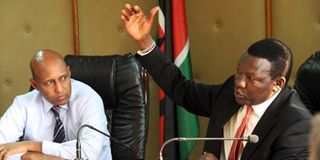Oil company sets stage for fight with the State

Industrialisation and Energy secretaries Adan Mohamed (left) and Davis Chirchir. Mr Chirchir terminated an exploration licence for Vanoil. PHOTO | FILE |
What you need to know:
- Vanoil is seeking Sh13 billion for what it calls the ‘illegal termination’ of its exploration licence
- The ICSID relies on bilateral investment treaties to protect investments of citizens of these countries.
- Vanoil aims to reduce its monthly costs by more than 75 per cent to allow it to focus on reaching full settlement with the government.
An oil exploration company expelled from Kenya last year has restructured in what it terms “preparation” for a fight with government for Sh13 billion in compensation for illegally terminating its license.
Vanoil, a Canadian firm that was exploring for oil and gas in Kenya, retired its president Sam Malin and replaced him with Don Padgett, who is said to have a wealth of experience in dealing with investment in “troubled countries”.
“The board of directors has instructed management to conduct an immediate review of all company operations. The priority goal is to eliminate non-essential costs, dispose of non-productive assets and secure sufficient funding to enable Vanoil to aggressively pursue its legal arbitration against the Republic of Kenya,” reads a statement posted on Vanoil’s website.
Vanoil disputes the revocation of its licence for blocks 3A and 3B located in Garissa which was ordered by Energy and Petroleum CS Davis Chirchir in February on the grounds the company had failed to carry out minimum exploration work in the blocks as required under the production sharing contract.
Vanoil has already written to the government about its intention for arbitration, and it is understood that the government has already started preparing its response to the issues raised by the exploration company. Its only known assets are in Kenya and Seychelles.
The production sharing contract, which all firms exploring for oil and gas must sign with the government, sets out the minimum work such firms should carry out within the tenure of the contract.
UNABLE TO DRILL
In its notice of arbitration, Vanoil said it was unable to drill at the sites because “operations were significantly impaired by incidents of local disturbance and unrest.
The Canadian company further said it was directed by local authorities to reduce and delay operations until a safe return to the site could be provided.
“Vanoil wrote to us about their intention of going for arbitration. We have studied their claim and handed it over to the attorney-general who will prepare a response on behalf of the government. We believe the issues raised by the company are not valid because they failed to stick to the terms of the contract,” Daniel Kiptoo, the legal advisor to the Energy cabinet secretary on petroleum told Sunday Nation.
Vanoil is seeking not less than Sh13.4 billion ($150 million)in compensation for “full and proper restitution” for its seven years of exploration and development based upon the net present value of its investments in Kenya to which it is entitled under the production sharing contract.
The firm has backed up its claim with the recent find of significant amounts of natural gas at the Sala-1 well located in the Anza basin where blocks 3A and 3B are located, saying the value of the blocks had increased after the discovery.
In its initial notice of arbitration, Vanoil indicated that it intended to pursue its claim at the United Nations Commission on International Trade and Law.
Last month, details emerged showing that the firm plans to use its UK and Swiss shareholders in its pursuit at the International Centre for Settlement of Investment Disputes (ICSID) located in Washington DC, and run by the World Bank. Kenya is a signatory to the ICSID.
The ICSID relies on bilateral investment treaties to protect investments of citizens of these countries. Kenya does not have an investment treaty with Canada but has arrangements with the UK and Switzerland.
Vanoil aims to reduce its monthly costs by more than 75 per cent to allow it to focus on reaching full settlement with the government.





